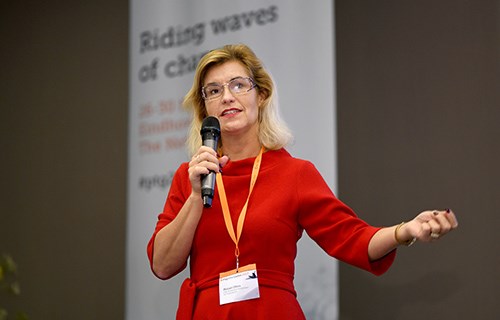Match-fixing: Understanding the motivations?

Marjan Olfers speaking at Play the Game 2017. Photo: Thomas Søndergaard/Play the Game
29.11.2017
By Marcus HoyProfessor Marjan Olfers of Amsterdam’s Vrije University described new research into betting monitoring and alert systems that are used to detect match-fixing. The research, she said, focused on systems used in all EU member states. Rates of false negatives – or fixed matches that are not flagged by the systems – are relatively common, she said. However, false positives are few.
Information exists on the Dark Web related to which matches are fixed, she said, but is well-hidden in private groups with strict entry criteria. The research concluded that no ideal monitoring system currently exists, but suspicious betting patterns may be better-detected in the future with the use of big data. Monitoring systems, she said, are unlikely to be effective without a broad information exchange between all interested parties.
Els De Waegeneer, a Researcher at Belgium’s Ghent University, described her research into what motivates athletes to fix matches. To refuse to fix a match on ethical grounds, she said, an athlete must recognise that a moral issue exists, make a moral evaluation of the act, and put the moral behaviours into practice.
The subject must place ethical concerns ahead of other factors such as success, fame and money. Occasionally, she pointed out, an athlete will have no moral qualms about fixing a match. “Some see match-fixing as a strategic act” she said.
De Waegeneer’s research revealed significant differences between attitudes to betting and non-betting related match fixing, as well as in different sports. Thus, she said, a variety of approaches are needed when it comes to raising awareness.
Virtual match-fixing
Marius Sprenger, Student Assistant at Germany’s University of Munster, has created a virtual computer world in which individual athletes are given various characteristics and motivations. High performing athletes are targeted by a “virtual betting mafia” and factors such as salary, bribing amount, legitimate win bonuses and potential sanctions are added. Sprenger concluded that computer simulations could potentially be used to identify high risk areas in the real world if the data entered reflects the actual circumstances of the athletes.
Nikolaos Theodorou, Manager at the Sports Integrity Project, described the “Fix the Fixing” initiative. The project aims to collect data to understand match-fixing in sport, and implement scientific knowledge and methods to deliver remedies.
The project, he said, is undertaking research into the psychological determinants of match-fixing. Athletes 1illing to fix matches are mostly men, he stated and can be found in both professional and amateur sports. Over one in three of those questioned by researchers suspected that a match in their league had been fixed, and financial difficulties and pressure from teammates were given as the main reasons for fixing. Many of those questioned were unaware of rules that seek to prevent team members, officials or family members betting on matches.
Paolo Bertaccini, Advisor at the Italian Government Office for Sport described his Anti Match Fixing Formula project, which seeks to develop “integrated mechanisms for cooperation between public and private actors to identify sports betting risks”.
The Italian authorities, Bertaccini pointed out, have solid experience in fighting organised crime, and the state has recognised match-fixing as a crime since 1988. The project, he said, is co-operates with other European nations as well as the United Nations Office on Drugs and Crime (UNODC).

Read more about Play the Game 2017





